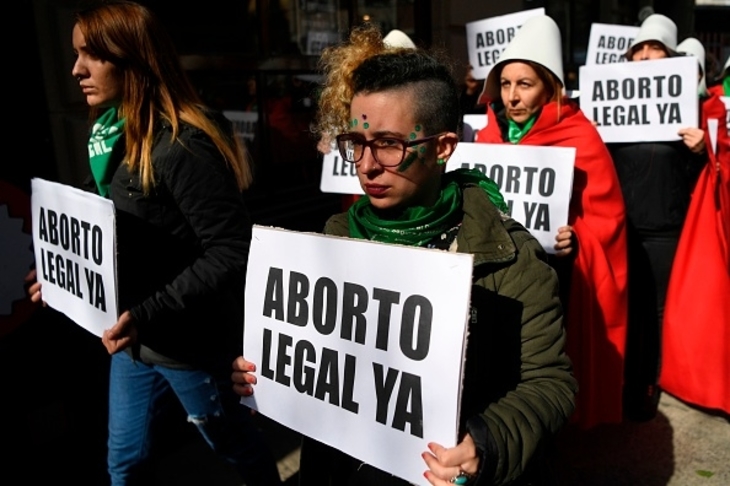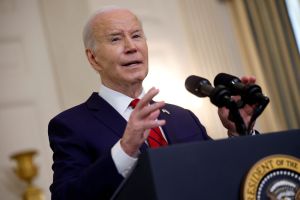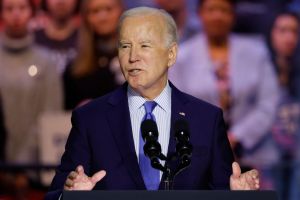‘The world is looking at you,’ the actress Susan Sarandon informed Argentina’s Senate on Tuesday, ahead of its vote on an abortion bill. ‘Give women the right to choose!’ She may have been inspired by Amnesty International, who had taken out a full-page ad in the international New York Times to tell the Senate: ‘THE WORLD IS WATCHING’.
In the early hours of Thursday morning, after a 16-hour debate, the senators failed to do as they were told. The bill, which would have legalised abortion up to 14 weeks – and beyond in the case of disability or a threat to the mother’s health – was defeated by 38 votes to 31.
Sarandon and Amnesty were right, in a way. Abortion has become a global culture war: there are no purely national debates on the subject. When the US government cancelled abortion funding in January 2017, an international coalition, She Decides, immediately sprang up. 50 governments answered the call; by the end of the year they had raised more than $400m to provide and advertise abortion around the world.
Argentina’s debate, likewise, attracted international attention. Amnesty and Planned Parenthood lent their weight to the campaign. The English-speaking media ran almost universally positive reports about the efforts to change the law.
The arguments on the ground were similar to those elsewhere. As in, for instance, Ireland, pro-choice campaigners repeated that abortion was happening anyway, so it might as well be legalised and made ‘safe’. As in Ireland, protesters dressed in Handmaid’s Tale costumes.
Pro-lifers also saw their cause in international terms. They pointed to the massive expansion of abortion in Europe and North America. Raul Magnasco, president of Más Vida, believes this was a crucial factor in winning the vote. Pro-lifers, Magnasco says over email, “made people conscious of the reality of abortion and the damage it has done in the few countries that have legalised it in the past. Even senators learned a lot.”
Argentina’s pro-life movement, like those in other countries, emphasised that their cause was about supporting both women and children. Slogans such as ‘Salvemos Las 2 Vidas’ echoed the Irish line ‘Love Them Both’. Politicians found this line of argument persuasive: some senators asked pointedly why they were being instructed to discuss abortion rather than improving social services for women.
Magnasco also thinks the internet has made things more difficult for pro-choicers. “It’s harder to lie to people all the time, because everyone can find the truth by themselves.”
Irish pro-lifers might be less sure of that. The death of Savita Halappanavar from sepsis was cynically misrepresented to make the case for abortion – and in Ireland, unlike Argentina, abortion was legalised with some ease.
The difference is that Argentina has a far stronger pro-life culture. Vast numbers marched in defence of the unborn – according to the highest estimate, admittedly from the organisers, three and a half million. Several pro-lifers are household names, like the actress Amalia Granata and the superstar TV chef Maru Botana. Imagine if the next time parliament debated sex-selective abortion, Olivia Colman and Mary Berry were out there speaking for the unborn.
Still, Argentina’s pro-lifers look to the future with some trepidation. The international campaign is relentless, and most Latin American countries are under pressure to relax their laws.
If we have to have a global culture war about anything, it might as well be abortion. Both sides are animated by compassion, but the debate ultimately pits two philosophies against each other. For one side, human fraternity, human solidarity, is so important that we must defend even the tiniest, most incapable people on earth. For the other side, adult autonomy is so important that we must defend the right to choose, even if the tools of our defence have to be the forceps and the suction machine.
Argentina’s pro-choice movement did make one original contribution: the video game Doom Fetito, in which players have to fight off pro-lifers before shooting dead a gigantic unborn child. It isn’t quite what you’d expect to find in an Amnesty report or a Planned Parenthood press release. But I suspect it tells us more than either about the real stakes of the global abortion debate.


















